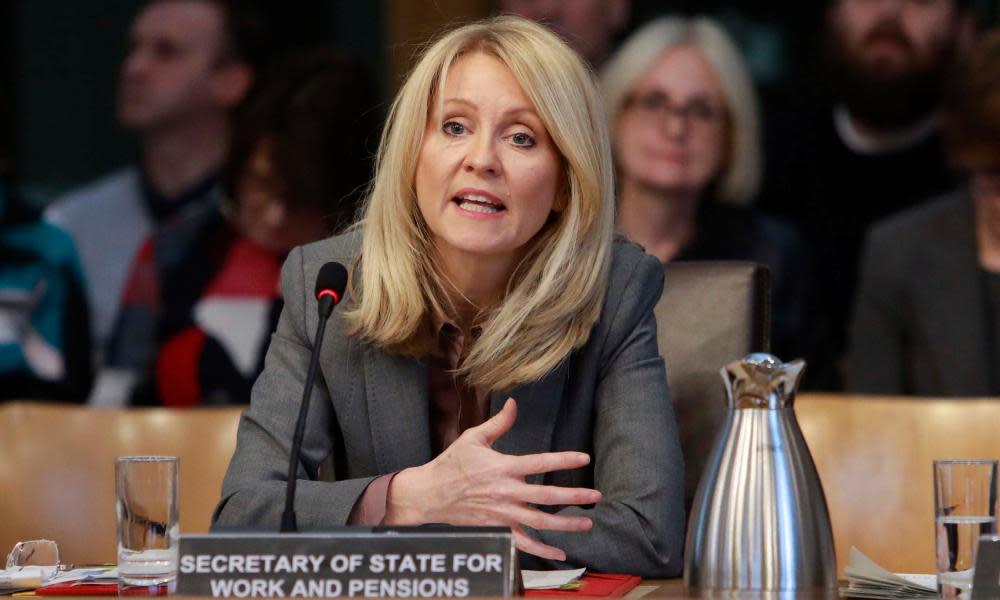The Guardian view on the tax credit ‘rape clause’: a disturbing part of a greater wrong

A year ago, a repugnant policy now known as the “rape clause” came into force. The government established a two-child cap for child tax credits (applied to universal credit too), but allowed women to claim for further children conceived without their consent. Women’s groups and medical staff warned that, among many other problems, this risked retraumatising victims by forcing them to disclose assault against their wishes. But the measure received relatively little attention, in part because it received no parliamentary debate or vote. Alison Thewliss, the sharp-eyed Scottish Nationalist MP who spotted it, was right to describe the policy as immoral. But she was wrong to say that smuggling it into law via a statutory instrument was the “final insult”: for another came this week, when the work and pensions secretary, Esther McVey, was challenged on the policy.
Ms McVey declared that when victims make the declaration, to a third party such as a health worker, they could find “an opportunity to talk about, maybe, something that has happened that they never had before so it is potentially double support … getting the money they need and maybe an outlet which they might possibly need”. Theresa May avoided such extraordinary insensitivity when the issue was raised at prime minister’s questions, but made no concessions.
This was an attempt to recast the ruthlessness of austerity as an act of munificence. The government gave, but only after taking away from a much wider group – and on the cruellest terms. It discriminates against many victims, since the exemption does not apply to mothers living with their rapist; officials appear unaware of how many assaults occur within relationships. Forcing women to name the child conceived during rape increases the risk that child will discover their origins and be stigmatised. And in Northern Ireland, where failure to report a crime is an offence, the medical or other staff told about the rape should inform police of the allegation – even if victims do not wish to pursue it. That puts both in an invidious position.
But the rape clause is only one element, albeit an especially pernicious one, within a rotten policy penalising many more families. Households with more than two children are hit when a parent loses a job or falls ill. Women who become pregnant unintentionally may find financial pressures tip their decision about whether to continue the pregnancy. Northern Ireland’s abortion laws mean few women there have such a choice. And though the government presents the cap as a matter of holding adults to account for their decisions, it is children who pay. The Child Poverty Action Group says that estimates suggest more than 250,000 children will be pushed into poverty by the end of the decade, representing a 10% increase in child poverty, and a similar number will fall deeper into poverty. Judgment on its legal challenge to the policy is due on Friday.
This affair has sinister resonance with the current Windrush scandal. In that case, too, the government initially refused to acknowledge a glaring injustice; and it did so because the particular injustice stems from a far broader one: a harsh regime pursued for political advantage with a spurious rationale of fairness. The creation of a “hostile” immigration regime is paralleled by the imposition of austerity in the welfare system and its justification with a similarly divisive ethos separating “deserving” and “undeserving” candidates for state support. In its impact assessment, the Department for Work and Pensions said the two-child cap would ensure that the system “is fair to those who pay for it, as well as those who benefit from it, ensuring those on benefits face the same financial choices around the number of children they can afford as those supporting themselves through work”. In fact, 70% of those claiming tax credits are already working.
This government fosters suspicion and division, setting people against one another. By immiserating families, it also erodes wider bonds and diminishes society. Scrapping the rape clause would alter, not eradicate, the unfairness to victims. Getting rid of the cap that produced it would be to everyone’s gain.

 Yahoo News
Yahoo News 
